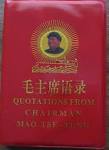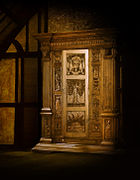
Today December 27th 2013, Mao Tse-Tung ( or Zedong in modern speech ) would have turned 120 years old. He is undoubtedly one of the central politcalfigures of the 20th Century along the likes of Lenin & Stalin in his own Communist camp, Roosevelt, Churchill and de Gaulle in the West or Hitler for the worst of reasons and the Mahatma Gandhi and Nelson Mandela for the best.
Form his birth in the small rural town of Shaoshan in the Hunan province of South East China to his death on September 9 1976 in Beijing, Mao rewrote his country’s history for better and for worst. Summarizing the man is difficult and biographies abound for the factual approach. Thus, it seemed easier to use the acrostic of his moniker and provide the readers with a very different look on a man of contradictions so that they can decide for themselves if he should stand as a hero or stoop as a villain.
M for March as in the Long March. After becoming a communist around the end of World War I, Mao rose to the leader’s role. When Chiang Kai-shek turned on the communists in 1927, Mao was in the Jiangxi province next to his birth’s one where he had established a Chinese Soviet Republic. In 1934, he fled the advance of the government’s troops that he had no chance to defeat and began the Long March with a hundred thousands fighters and their families. After nearly 13 000 kilometers, the 30 thousand survivors got to the desolate Northern province of Yanan where they slowly regrouped and were joined by new young followers. As a military move, the Long March was a great decision while the cost in human lives makes it a tragedy. Contradiction number one!
A is for Autocratic. On many occasions, as right before the Long March in the small republic or in the 1950’s implementation of reforms and the following Great Leap Forward and lastly in the end of the 60s purge of the undesirables, dissent was treated with extermination. You disagree : you die!
O is for Orator. In the old school tradition of great men of state, Mao could move audiences easily, creating a new dream in one speech as he did on Tiananmen square in establishing the People’s Republic of China in October 1949 or reviving an old flame as happened on his return to the front scene in 1966 through rallies that earned him a following of young people that got swayed by the words and remained oblivious to the past record of the man.
Together, those two traits of populism and authoritarianism form the second contradiction, one on which political careers are successfully built … even in democracies.
TSE would have to stand for True, Sincere and Evil. All great men are true if only to themselves and their ideas. Mao followed his own path, forged it even and adopted a vision which he never wavered from. He did however sincerely attempt at times to allow for the concerns of others as when he tried to take dissenting opinions in account on the Hundred flowers Campaign of 1956. But that Sincerity applied first and foremost to himself and doubting his own Truthfulness was not part of it. This egotism breeds certainty which in turn shields one from outside values. It is thus that the two aforementioned qualities engender Evil as their owner then puts his sincere truth above reality.
T as in Toll : No matter how one wants to acknowledge the work of Mao, the numbers come back to shadow it. The Great Helmsman is directly or indirectly linked to about 60 million deaths. No man in history accounts for as much. The landlords that fell after world War II, the uncounted famine victims of the Great Mishap Backward, at the end of the 60s and the labor camps disappearances all add to more than either Stalin or Hitler. It is but the closed secretive nature of China until the 21st century began that allowed this to remain hidden!
U stands for Uncompromising : Mao’s ideas were clear. His rule was inefficient. The man that made himself and his country could not manage it in the long run. Had he been able to understand that, to accept this flaw of his in regard to day to day business, that he would have delegated this job to those to whom it came naturally? Was it a rebellion to his strict grain dealer father or more simply the eternal dichotomy between men of ideas and men of actions? In any case, Mao was constantly attempting and rarely succeeding. His utopias were so grand that they did not fit into everyday reality. He valued his will over any obstacle and dismissed unflattering results as flukes!
This showed in his writings : bourgeois-democratic was a term of his! No matter that theoreticallly one does not preclude or exclude the other, for Mao it was factual. Democracy stood as bourgeois which likely explains why as workers in the West won a modicum of respect for their work and lives, torture and hardship was the lot of all in China that disagreed however slightly with the Party’s line? All brawn and no ideas make one a brutish idiot; all ideology and no ability makes one useless?
N as Nation. All of what Mao did remains utterly Chinese. The outside world is but the provider of a series of pretexts. His mothers’ death that throws him from his past into the present counts less in 1918 than the successful revolution in Russia. Japan’s conquest of the Celestial Empire that forces a renewed collaboration with the Kuomintang fades into oblivion by 1945 and the USA’s influence never gets a foothold ending with Taiwan’s formation. His personal choice of a teaching careers pales in comparison to the need to crush the intellectual elite and intelligentsia to “save” communist China! Mao managed to marry his destiny to that of the country to the point of the latter having to submit to the former. No wonder that many thought him more important than it?
G corresponds to General. Mao the rebel and military man stands as an icon. His feats in that domain overshadowed his political errors and indeed permitted him to shine long past the dimming of his stateman’s star. You may not like the civitas leader but the Ceasar in that man earned his laurels twice over. That might have been the crux of his life. Had he relinquished power to civilian authorities and enjoyed the respect due to the saviour of the country that the view we now hold of the man would have been less critical.
That is our final contradiction. Mao Tse-Tung is remembered mostly for his policies. These were his worst flaw. Mao Tse-Tung is not as renowned for his military prowess although he did not falter “on that front”?
Time will tell. Mao died less than 40 years ago and if china has changed radically, if Xi Jinping is leading a thorough set of reforms, it is not until those have come to past and a new generation has risen to comment on the Great Helmsman that a definitive answer will come.
Until then, the balance sways …
Tay.
Mao’s major words can be found here :
http://www.marxists.org/reference/archive/mao/selected-works/index.htm
